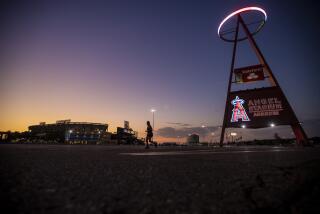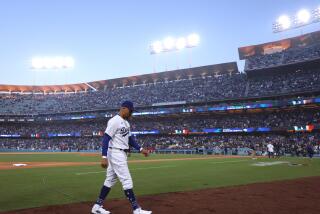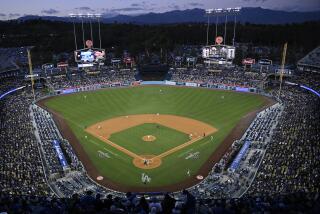Wrigley Lights Wouldn’t Brighten Cub Chances
- Share via
CHICAGO — The last time the Chicago Cubs won a pennant few major league teams were playing a whole lot more than the 18 or so night games the Cubs are planning at home next year.
Since the Cubs won that flag in 1945, the argument has been that the Cubs are at a competitive disadvantage because they’re the only club that doesn’t play night games in their home park.
The argument is likely to continue even though a proposal to play 18 night games next year at Wrigley Field--a plan still subject to more political debate--has been hammered out after five years of discussions. Installation of lights could take less than five months once final approval is given by the city council and the state Legislature.
The Cubs’ baseball chairman, John Madigan, says the compromise will allow the club to stay at Wrigley Field and meet the requirements to stage an All-Star game, playoffs or World Series games which TV networks insist must be played at night. It also would give a boost to superstation WGN-TV’s nighttime ratings with Cubs games at home and allow those who couldn’t get off work during the day an opportunity to see Chicago’s National League entry under the lights.
But the installation of lights at the NL’s oldest ballpark shouldn’t lead die-hard Cubs fans to believe the pennant drought will end in 1988.
Jim Frey, the newly appointed vice president in charge of player personnel, has never bought the theory that lack of lights has hurt the Cubs.
“We won it in 1984, didn’t we, and we didn’t have lights,” says Frey, the manager of the NL East champion Cubs three years ago. “I also never bought the theory about how the warm days in August wore down the players. There were some days I managed in this ballpark in August and it was downright cold.”
In many ways, playing 18 night home games could be a disadvantage for the Cubs.
Under the compromise worked out by Chicago Mayor Harold Washington, the club will reduce its scheduled 3:05 p.m. starts from 29 to seven. All night games will start at 7:05 p.m. with no beer sales allowed after 9:20 p.m. or the seventh inning, whichever comes first. The way the Cubs pitching staff has been over the years, beer sales could stop by about the third inning considering the length of some of the games.
The 3:05 p.m. starts were uniformly disliked by the Cubs and opponents.
“I was surprised no one ever got killed playing in those conditions,” says St. Louis Manager Whitey Herzog.
But the Cubs had a distinct advantage playing in the shadows. Fireballing reliever Lee Smith was nearly unhittable after 5:30 p.m. Under the lights, his fastball won’t seem as menacing.
On those occasions when the games had to be suspended because of a lack of lights, the Cubs also enjoyed an advantage. Suspended games usually turned out to be “sudden death” affairs played like an extra-inning game. The home team usually enjoys the advantage and the Cubs won’t have that provision with lights.
Although there will be only 18 night games, it is a safe bet some of the longer games or those that go into extra innings will require the lights be turned on.
The agreement for 18 night games covers the next 15 years. At first, 18 night games at Wrigley Field will seem like road games to the homestanding Cubs, who won’t have the necessary amount of games or time to adjust to the lighting.
If fans think the nature of lights at one ballpark aren’t a factor, they should ask some of the outfielders who had to play in the Metrodome this past season. Some players are still getting used to the lights at some parks. Candy Maldonado of the Giants can attest to that after the critical sixth game of the NL playoff series with the St. Louis Cardinals.
Actually, the unique nature of Wrigley Field--no lights, ivy on the walls, games during the day--should have given the Cubs an advantage for the past 42 years.
Teams that gradually got used to playing night baseball at their own parks or in the other NL cities should have been the ones with the disadvantage coming into Wrigley Field.
With few exceptions, that was never the case. The reason visiting teams succeeded at Wrigley Field was lack of talent on the home side--not because of the lack of lights.
Frey’s 1984 division championship team proved that. And unless there is a radical switch in the makeup of the team, lights for post-season play won’t be a benefit for the Cubs for some time.
In fact, it could shed more light on the weaknesses of the club. And there won’t be that 42-year-old excuse of not having lights at Wrigley Field anymore.
More to Read
Go beyond the scoreboard
Get the latest on L.A.'s teams in the daily Sports Report newsletter.
You may occasionally receive promotional content from the Los Angeles Times.









